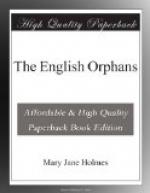“If you mean the brandy bottle,” said Henry, growing more and more excited, “have I not sworn to quit it, and is it for you to goad me on to madness, until I break that vow?”
“Forgive me if I have been too harsh,” said Jenny, taking Henry’s hand. “You are my brother, and Mary my dearest friend, and when I say I would not see her wedded to you, ’tis not because I love you less, but her the more. You are wholly unlike, and would not be happy together. But oh, if her love would win you back to virtue, I would almost beg her, on my bended knees, not to turn away from you.”
“And I tell you her love can win me back, when nothing else in the kingdom will,” said Henry, snatching up the note and hurrying away.
For a time after he left the room, Jenny sat in a kind of stupefied maze. That Mary would refuse her brother, she was certain, and she trembled for the effect that refusal would produce upon him. Other thoughts, too, crowded upon the young girl’s mind, and made her tears flow fast. Henry had hinted of something which he could tell her if he would, and her heart too well foreboded what that something was. The heavy sound of her father’s footsteps, which sometimes kept her awake the livelong night, his pale haggard face in the morning, and her mother’s nervous, anxious manner, told her that ruin was hanging over them.
In the midst of her reverie, Henry returned. He had delivered the letter, and now, restless and unquiet, he sat down to await its answer. It came at last,—his rejection, yet couched in language so kind and conciliatory, that he could not feel angry. Twice,—three times he read it over, hoping to find some intimation that possibly she might relent; but no, it was firm and decided, and while she thanked him for the honor he conferred upon her, she respectfully declined accepting it, assuring him that his secret should be kept inviolate.
“There’s some comfort in that,” thought he, “for I wouldn’t like to have it known that I had been refused by a poor unknown girl,” and then, as the conviction came over him that she would never he his, he laid his head upon the table, and wept such tears as a spoiled child might weep when refused a toy, too costly and delicate to be trusted in its rude grasp.
Erelong, there was another knock at the door, and, hastily wiping away all traces of his emotion, Henry admitted his father, who had come to talk of their future prospects, which were even worse than he had feared. But he did not reproach his wayward son, nor hint that his reckless extravagance had hastened the calamity which otherwise might possibly have been avoided. Calmly he stated the extent to which they were involved, adding that though an entire failure might be prevented a short time, it would come at last; and that an honorable payment of his debts would leave them beggars.
“For myself I do not care,” said the wretched man, pressing hard his aching temples, where the gray hairs had thickened within a few short weeks. “For myself I do not care but for my wife and children,—for Rose, and that she must miss her accustomed comforts, is the keenest pang of all.”




